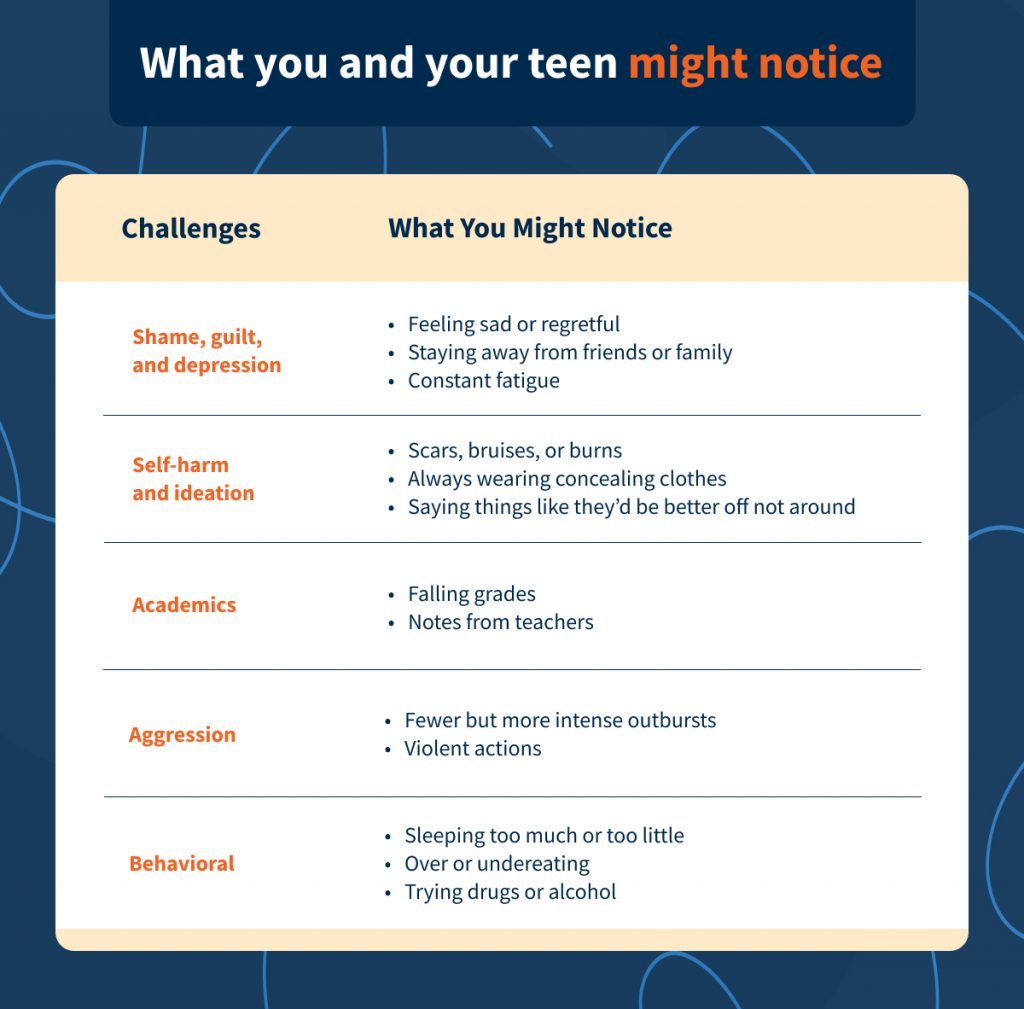Challenges you might experience with a teen who has DMDD
DMDD is rooted in persistent irritability, meaning your teen will likely be in a bad mood most of the time—even if they try and hide it. While they may have thrown serious tantrums as a child, their symptoms are likely to change as they get older.
Your teen hasn’t just been acting out because they want to or because they feel like it. They’ve had a hard time regulating their emotions and mood. Things that should make them happy may not bring them any joy, which can be frustrating. On the other hand, things that make them angry or sad can be upsetting to the point that it’s hard to calm down.
Parenting a teen with DMDD
Moodiness and issues at school can make your job as a parent quite challenging. It can also strain your family dynamics and relationships at home. However, there are steps you can take to reduce the impact of DMDD on your teen and family:
Educate yourself
Learn more about disruptive mood dysregulation disorder, reach out for support from mental health professionals, and learn effective parenting strategies from other parents in similar situations. While your teen is in treatment at Family First, we’ll provide parental education, family counseling sessions, and support groups.
Set clear boundaries and expectations
Adolescents with DMDD need consistency and structure in their daily lives. You can provide this by discussing boundaries and expectations with your child and ensuring you follow through every time. If you are unsure how to begin this process, contact a mental health professional specializing in young people for guidance.
Promote a balanced lifestyle
Everything your teen does will have an impact on their mood. Getting better sleep more often can help level out their mood. Exercising on a regular basis can relieve stress and help them be more mindful—it can also help them get better sleep. Eating a balanced diet with fewer junk foods and more whole, nutritious options can also play a big role. The best part is that all of these practices can be parts of a consistent routine that allows them to stay regulated.
Stay involved in your child’s treatment
Although your child may not want to discuss everything they talk about in therapy, let them know you are available and willing to listen to whatever they would like to share. It is also helpful to assist your child with medication management by reminding them to take their medication as advised and tracking any side effects or improvements they experience.
What to know about DMDD treatment for teens
Therapy
Medication
Parental training and support
A young person with disruptive mood dysregulation disorder can feel like they have no control over intense emotional outbursts. Along with medication and therapy, they will need your support and encouragement to follow through on the advice and resources they receive from their therapy sessions.
Taking care of yourself
You’ve already done so much raising your teen. You might not have had all the tools you’ve needed until now, but you’re making the right choice in learning more and looking to get help. During this time, you need to make sure you’re taking care of yourself, too. Getting enough sleep, exercising, eating healthy, and establishing a routine can also help you practice good self-care.
There are also support groups that you can join that allow you to connect with other parents who are in similar situations. You might also find working on your own mental health through therapy and having family or marriage counseling sessions helpful. Balance is out there, and help is available so you can find it.
Frequently asked questions
Do kids grow out of DMDD?
Over time, symptoms of DMDD can go away and/or change. Rather than throwing frequent outbursts, teens may become more depressed and/or anxious. Adults who were diagnosed with DMDD as a child are more likely to develop severe depression or anxiety.
Is DMDD on the autism spectrum?
No. DMDD is a behavioral and mood regulation disorder. Autism is a neurodevelopmental disorder. However, many people with autism do have issues regulating their mood and may receive a diagnosis of co-occurring DMDD.
How do you discipline a teen with DMDD?
Be patient with your teen and set clear boundaries and expectations. Don’t escalate the situation, and do your best to diffuse it before trying to discipline them. When setting boundaries and expectations, work with them to establish a routine and find ways to help them calm down together.
What is the best therapy for DMDD?
It depends. Every person has a different experience with therapy and will require a personalized approach. CBT, DBT, and medications are some of the most popular—and effective—interventions for DMDD.
What medication is used for emotional dysregulation?
Stimulants, antidepressants, and atypical antipsychotics can be used to manage the symptoms of DMDD, including emotional regulation. Every person responds differently to different medications. So, if your teen is prescribed a medication, work with their prescribing physician to learn more about what they’re taking and to manage side effects.
Call Family First Adolescent Services for help now
With more than 120 years of combined clinical experience, your teen will be in good hands when they get treatment in one of our South Florida programs. We also work closely with parents, offering training, family therapy, education, and support groups. Call 888.904.5947 or message us online now.


